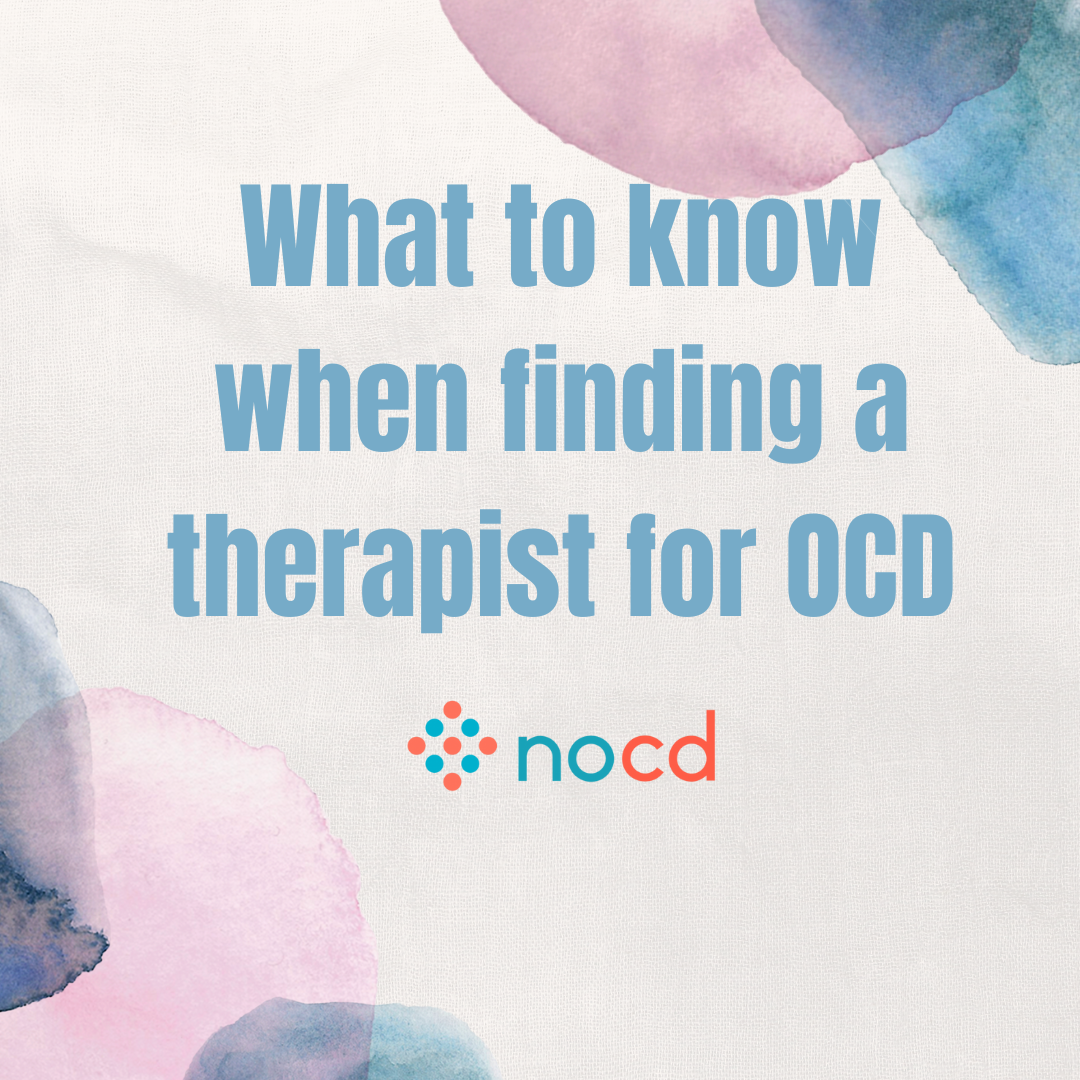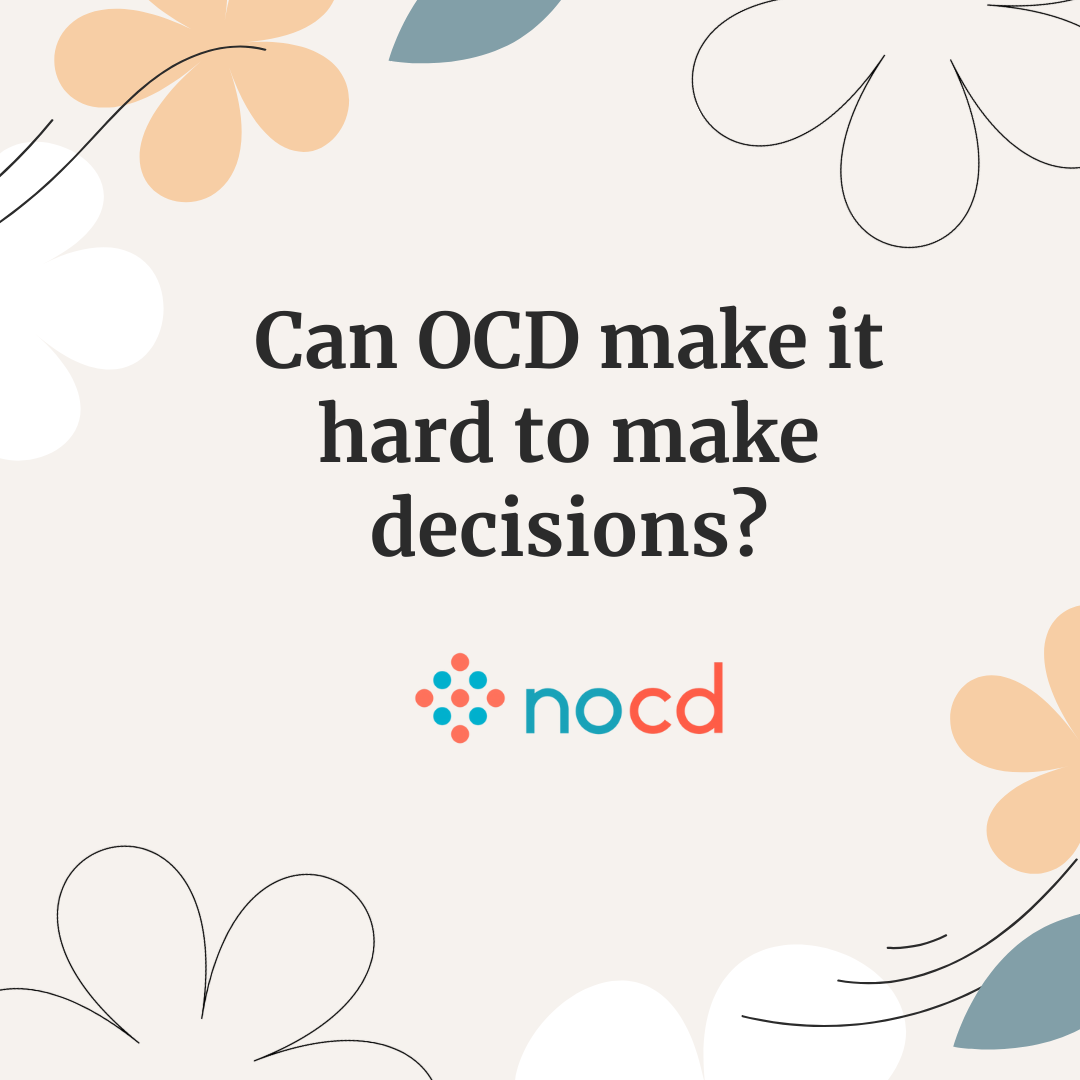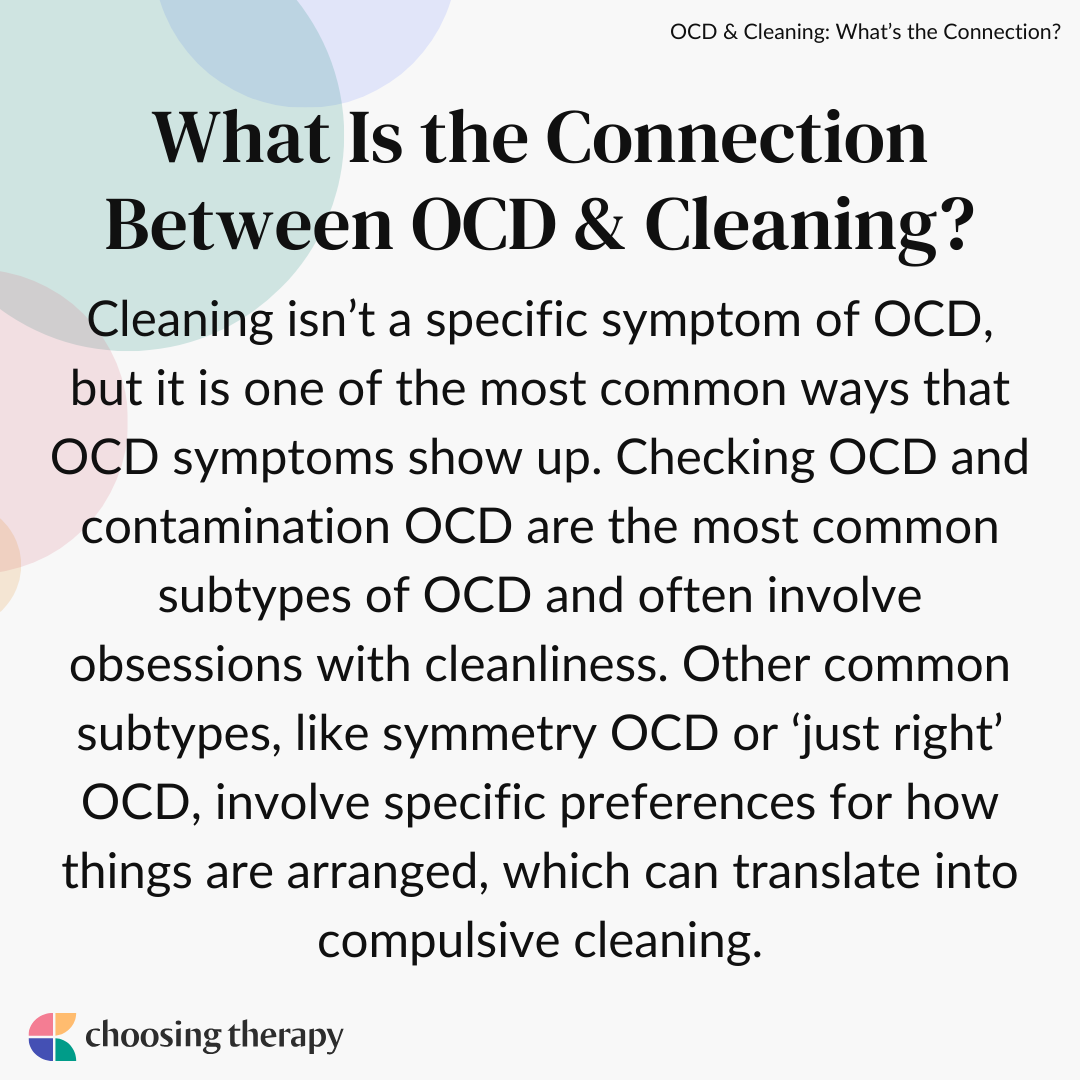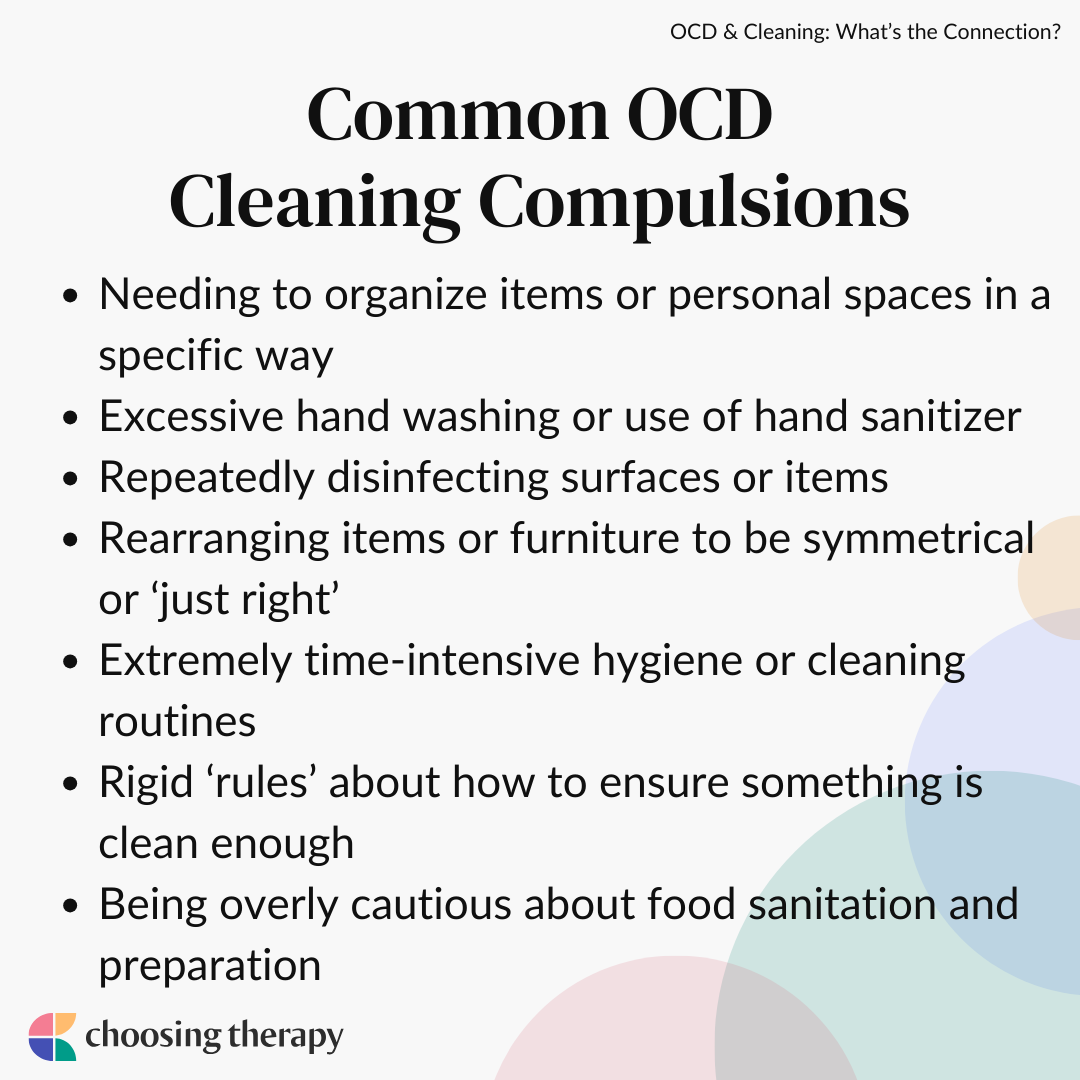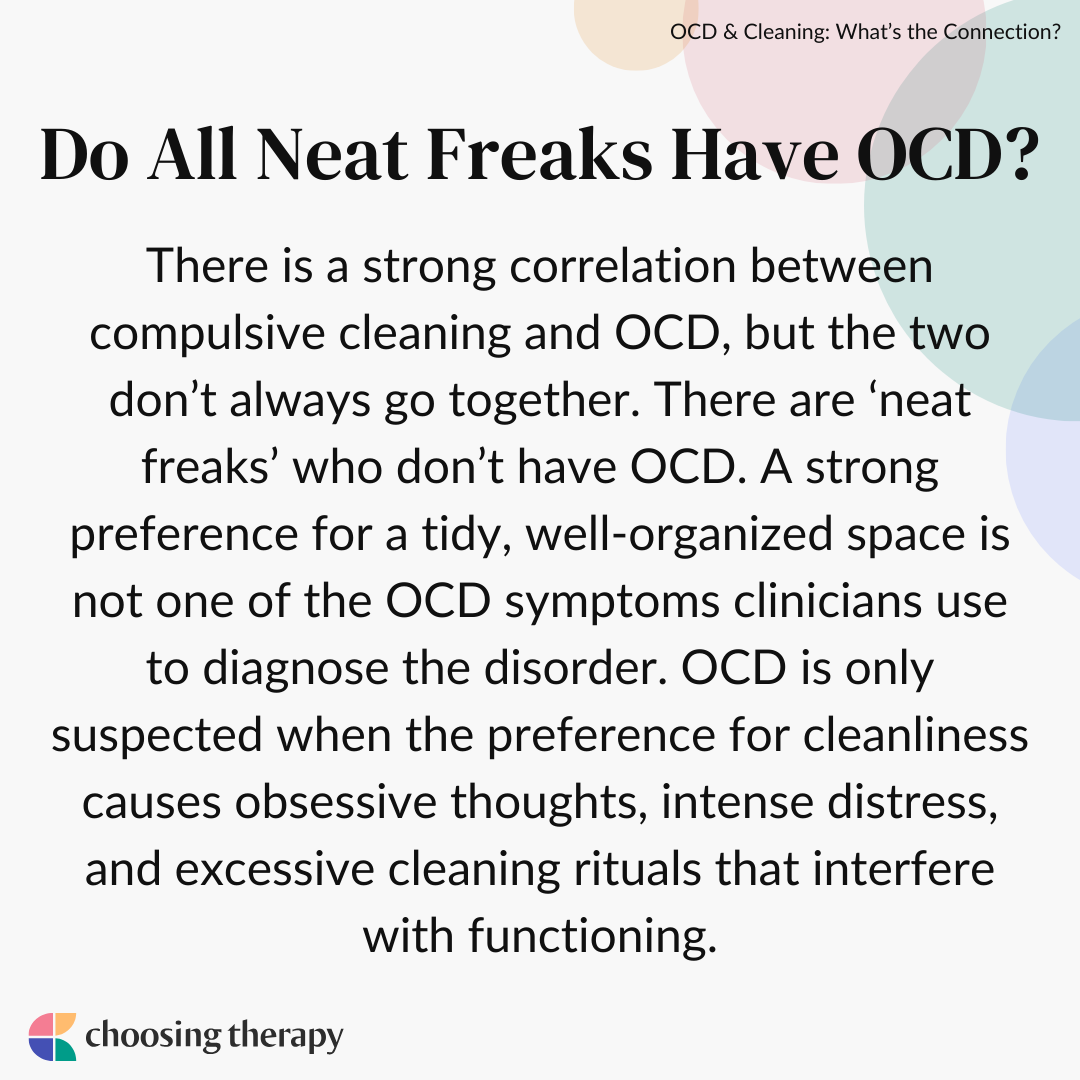People with OCD use compulsive rituals and routines, like cleaning, to cope with unwanted thoughts and feelings related to their disorder. Excessive hand washing, organization, and disinfecting surfaces are examples of common cleaning compulsions in OCD, affecting about 75% of people with this diagnosis.1,2,3 Like other OCD symptoms, compulsive cleaning can often be treated with specific therapies, medications, or both.4
What is the best therapy for OCD? Exposure And Response Prevention Therapy (ERP) – Do live video sessions with a therapist specialized in ERP, the gold standard treatment for OCD. Treatment from NOCD is covered by many insurance plans. Start With A Free 15 Minute Call
What Is OCD?
Obsessive compulsive disorder (OCD) is a mental health disorder that involves obsessive thoughts and compulsive behaviors. People with OCD have repetitive, intrusive thoughts (obsessions) that cause much distress. The specific kinds of obsessive thoughts in OCD can vary, but are always anxiety-provoking. OCD obsessions often involve fears of contamination, disease, failure, rejection, inappropriate thoughts, or immoral actions.1,3,5,6
Ritualistic behaviors and rigid routines, called compulsions, are used to alleviate intrusive thoughts and the distress they cause. Sometimes, compulsions are clearly linked to the kinds of OCD obsessions a person has (i.e. hand washing in contamination OCD), and other times they aren’t (i.e. handwashing in harm OCD). OCD compulsions can become so elaborate that they interfere with a person’s normal routine and functioning.7,8
What Is the Connection Between OCD & Cleaning?
Cleaning isn’t a specific symptom of OCD, but it is one of the most common ways that OCD symptoms show up.1,2,3 Checking OCD and contamination OCD are the most common subtypes of OCD and often involve obsessions with cleanliness.3 Other common subtypes, like symmetry OCD or ‘just right’ OCD, involve specific preferences for how things are arranged, which can translate into compulsive cleaning.
Compulsive cleaning can even show up in subtypes that have nothing to do with cleanliness or order. For example, someone with pedophilia OCD might compulsively clean to avoid intrusive sexual thoughts or even to feel better about themselves after having these kinds of thoughts.9,10
Interestingly, several studies have found that people with OCD often use cleaning compulsions to resolve feelings of guilt or shame. While it isn’t always the motivation for OCD cleaning, studies suggest cleaning acts as a form of moral restitution, alleviating OCD guilt related to a moral transgression.9,10 Brain imaging studies have shown that the act of cleaning can activate areas of the brain involved in regulating emotions like shame, fear, and disgust, especially in people with OCD.11
Common OCD Cleaning Compulsions
Common OCD cleaning compulsions include:2,3,7,9
- Needing to organize items or personal spaces in a specific way
- Excessive hand washing or use of hand sanitizer
- Repeatedly disinfecting surfaces or items
- Rearranging items or furniture to be symmetrical or ‘just right’
- Extremely time-intensive hygiene or cleaning routines
- Rigid ‘rules’ about how to ensure something is clean enough
- Being overly cautious about food sanitation and preparation
- Taking extreme precautions to avoid illnesses or infections
- Needing to throw away any potentially ‘contaminated’ items
- Excessive time researching cleaning methods
- Extreme avoidance of people, places, or things that may be unclean
- Refusing to use public facilities because of contamination fears
Treatment For OCD NOCD: Online OCD Treatment Covered By Insurance – Regain your life from OCD. Do live video sessions with a licensed therapist specialized in treating OCD. Treatment from NOCD is covered by most major insurance plans. Learn how you can use your insurance benefits. Visit NOCD Talkiatry: Is OCD Medication Right For You? Speak with A Doctor – Talkiatry can match you with a psychiatrist who takes your insurance and is accepting new patients. They’re in-network with major insurers and offer medication management with supportive therapy. Free Assessment
Are All People With OCD Obsessed With Cleaning?
About 75% of people diagnosed with OCD have compulsive habits related to cleaning, making cleaning one of the most common OCD compulsions.1,2,3 Compulsively organizing, rearranging, disinfecting, hand washing, or complex personal hygiene habits are all examples of OCD cleaning compulsions.9,10
While cleaning one’s home is considered normal and even healthy for most people, these activities often become excessively rigid and time-consuming for someone with OCD. For example, people with contamination OCD might wash their hands until they bleed, spend hours sanitizing their home, or even refuse to leave home. These compulsive cleaning rituals can demand so much time, attention, and energy that it becomes impossible to live a normal life.1,8
Do All Neat Freaks Have OCD?
There is a strong correlation between compulsive cleaning and OCD, but the two don’t always go together. There are ‘neat freaks’ who don’t have OCD. A strong preference for a tidy, well-organized space is not one of the OCD symptoms clinicians use to diagnose the disorder. OCD is only suspected when the preference for cleanliness causes obsessive thoughts, intense distress, and excessive cleaning rituals that interfere with functioning.7,8
There are a few other ways to distinguish a normal level of cleanliness from OCD. People with OCD are more easily triggered and may become distressed when a single item is out of place. They are also less likely to be fully satisfied when their environment is clean. This can lead to more chronic distress and anxiety, as well as a perpetual feeling that things are ‘incomplete.’9,10
What Causes OCD?
There is not one singular cause of OCD, and most experts believe that a number of factors play a role. Genetic factors are believed to play a significant part. Mental health conditions and certain bacterial infections can also increase the risk for OCD. Environmental risk factors like experiencing trauma in childhood can also escelate the likelihood of developing OCD.12
Factors believed to cause OCD include:12
- Genetics: A family history of OCD or having specific genes linked to OCD
- Neurological factors: Abnormalities in the brain structure, chemistry, or wiring
- Personality traits: Having a highly neurotic, perfectionistic or conscientious personality
- Childhood trauma: Experiencing abuse, neglect, or adversity in childhood
- Mental health: High levels of stress, anxiety, or having a mental health diagnosis
- Infections: Certain types of strep infections causing autoimmune reactions (PANDAS)
Are OCD Cleaning Symptoms Preventable?
OCD compulsions develop over time as a person repeats certain behaviors in response to emotional distress. In theory, it could be possible to prevent the development of OCD cleaning compulsions by resisting compulsive urges early on, but most people understand the importance of resisting these urges after an OCD diagnosis. By this time, compulsions have usually worsened and are very difficult to overcome alone.12
Do I have OCD? The first step to getting help is an accurate clinical assessment and diagnosis. NOCD’s therapists will provide a comprehensive assessment of your experience. If they find that you do not meet the criteria for OCD, they will still help assist you in identifying what you may be experiencing. Get Started With A Free 15 Minute Call
Treatment for OCD
OCD is one of the most debilitating mental illnesses, but it is usually treatable. Some people are able to overcome their OCD symptoms with therapy alone, while others require a combination of therapy and medication. Lifestyle and behavior changes are also an essential part of OCD treatment and are necessary to help the person maintain their recovery from OCD.4,12
Effective treatment options for OCD include:4,13
- Exposure and Response Prevention (ERP): ERP for OCD is one of the most effective forms of treatment, and has been proven to work especially well for people with cleaning and checking compulsions. This therapy helps people gradually become more desensitized to their OCD triggers while also teaching them coping skills to resist the urge to engage in compulsive behaviors.
- Cognitive behavioral therapy (CBT): CBT for OCD is another effective, structured form of therapy that helps people challenge irrational thought patterns and make lasting changes to their behavior. In many cases, CBT for OCD also includes some elements of exposure therapy, which helps to desensitize people to situations that trigger anxiety and OCD symptoms.
- Acceptance and Commitment Therapy (ACT): ACT is a mindfulness-based therapy that encourages people with OCD to observe their obsessive thoughts without getting too involved in them. ACT also encourages people to identify their core values and use them as a guide to make better, healthier decisions that help them experience more fulfillment in their daily lives.
- Medications for OCD: The most commonly prescribed medications for OCD are SNRI and SSRI antidepressants, which help to balance brain chemicals that are involved with emotions and mood. In some initially treatment-resistant cases, antipsychotic medications are also prescribed to people with OCD to help alleviate intrusive and obsessive thoughts. Medication is always recommended in conjunction with therapy rather than as a standalone treatment.
When to Seek Professional Support for Cleaning OCD
Untreated OCD compulsions tend to become more time-consuming and debilitating over time.12 When compulsive cleaning begins to take up more than one hour per day or to interfere with normal daily routines or responsibilities, it’s a good idea to seek professional help.7,8 A variety of treatment options are available for people with OCD, including online therapy, intensive outpatient programs, and psychiatric medication clinics. The most important thing when looking for treatment is to find someone who specializes in OCD, which can be done through specific online programs like NOCD.
Many people have success finding a therapist or psychiatrist by using an online directory that allows them to narrow their search by location, insurance type, and specialty. Because therapists vary so much in their approach, it’s also a good idea to find a therapist who has been trained in ERP, CBT, or another proven OCD treatment.
In My Experience
To help our readers take the next step in their mental health journey, Choosing Therapy has partnered with leaders in mental health and wellness. Choosing Therapy is compensated for marketing by the companies included below. OCD Therapy NOCD: Effective, Affordable, & Convenient OCD Therapy Do live, face-to-face video sessions with a therapist who specializes in treating OCD and get 24/7 support between sessions. NOCD is covered by many insurance plans and is available nationwide. Visit NOCD Treatment From An Online Psychiatrist Talkiatry OCD is treatable. Talkiatry specializes in OCD and provides personalized care with medication and additional support. Get started with a short assessment. OCD Community - Free To Join! Join others who are overcoming OCD. Participate anonymously. Find support, connect, and overcome challenges with us. The community is managed by NOCD. Join The Community OCD Newsletter A free newsletter from Choosing Therapy for those impacted by OCD. Get helpful tips and the latest information. Sign-UpAdditional Resources
What to know when finding a therapist for OCD With so much information out there regarding providers and treatment options for obsessive compulsive disorder, it can be hard to know exactly where to start—especially when you have to consider everything from the type of provider to the different treatment methods, as well as how you’ll fit it into your busy schedule. Can OCD make it hard to make decisions? From choosing what to wear in the morning to picking what to eat for dinner, decision-making is a part of everyone’s daily routine. But for millions of people with Obsessive-Compulsive Disorder (OCD), making any choice can feel like a daunting, sometimes impossible task.